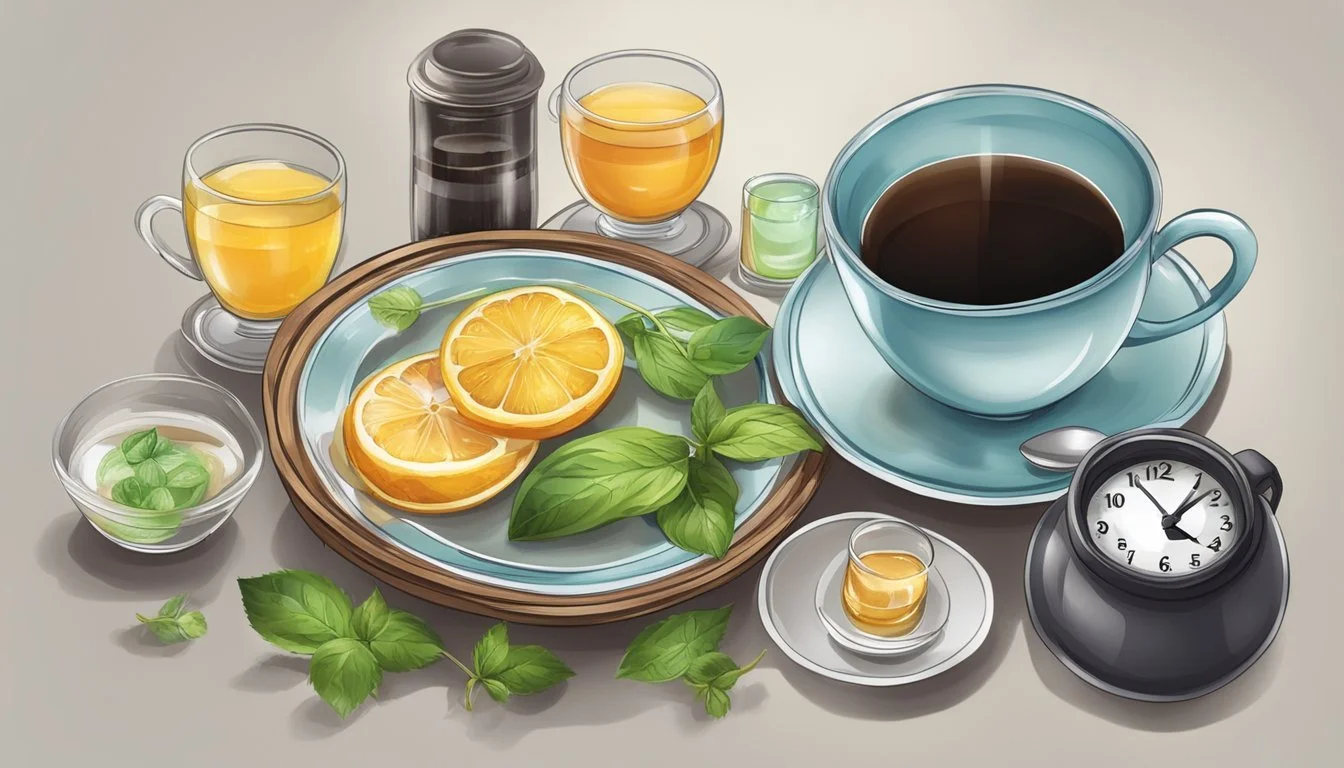Intermittent Fasting and Non-Alcoholic Beverages
Your Guide to Suitable Drinks
Intermittent fasting is an eating pattern alternating between periods of eating and fasting, which has gained popularity for its potential health benefits, including weight loss and improved metabolic health. The fasting window, which can last anywhere from 16 to 48 hours depending on the specific regimen, is a critical component of this approach. During this time, individuals abstain from caloric intake to trigger various physiological responses that are believed to contribute to the benefits of the dietary pattern.
While solid foods are clearly off-limits during the fasting window, there is often confusion about what beverages can be consumed without breaking the fast. Water, both still and sparkling, is universally accepted since it contains no calories and supports hydration. Other non-caloric beverages like black coffee and tea are generally considered acceptable because they do not contain sugar or substantial amounts of macronutrients that would disrupt the fasting state.
It is important for those practicing intermittent fasting to consider the implications of beverage choices during both the fasting and eating windows. While hydrating with water is essential, incorporating other non-caloric drinks can assist in maintaining the fast without compromising its potential benefits. In contrast, beverages high in sugars or calories are best reserved for the eating window to align with the principles of intermittent fasting and maximize its effects on health and weight loss.
Understanding Intermittent Fasting
Intermittent fasting involves alternating cycles of fasting and eating. It is a structured approach to eating that can influence various metabolic processes within the body.
Principles of Intermittent Fasting
Intermittent fasting is based on time-restricted feeding where individuals consume meals during designated hours, followed by a period of fasting. This approach can range from the 16/8 method, where one might fast for 16 hours and eat during an 8-hour window, to alternate-day fasting and 24-hour fasts. It's not about restricting what foods a person eats, rather when they eat them.
Fasting Period: Typically ranges from 16 to 24 hours.
Eating Window: Often lasts between 4 and 8 hours.
Health and Metabolic Impacts
Intermittent fasting may have several health benefits, primarily revolving around metabolic enhancements.
Metabolism and Blood Sugar Levels: By fasting, individuals may improve their metabolism, reduce insulin levels, thereby potentially stabilizing blood sugar levels. This could facilitate a shift from utilizing glucose for energy to burning stored fat.
Fat Burning and Insulin Response: During fasting periods, lower insulin levels can promote fat burning. The body, when depleted of glucose, may turn to burn adipose tissue (fat stores) for energy.
Autophagy: This process, where cells clean out any unnecessary or dysfunctional components, may be induced during fasting periods, contributing to cellular repair and maintenance.
Keto Diet Compatibility: People practicing a ketogenic diet often find intermittent fasting complementary as both regimens foster a state of ketosis, where the body consumes fat for fuel instead of carbohydrates.
Intermittent fasting's influence on insulin levels and the associated insulin response is a key factor in the body's switch to fat burning and can be part of an overall strategy for improving health.
Beverages to Consume While Intermittent Fasting
Selecting the right beverages during intermittent fasting is crucial for maintaining the fast while ensuring proper hydration and nutrient intake. This section outlines permissible drinks and their benefits.
Water and Hydration
Water is the essence of hydration and is fundamental during intermittent fasting. Not only does plain water support essential bodily functions, but it also carries no calories, preserving the fasted state. For variety, mineral water or seltzer are acceptable alternatives, both still devoid of calories and providing a feeling of fullness.
Plain Water: Essential for hydration; zero calories
Mineral Water: Supplies minerals; no calories
Seltzer: Carbonated water offering a feeling of satiety; calorie-free
Tea and Coffee Benefits
Tea and coffee are excellent beverage choices for those engaged in intermittent fasting, provided they are consumed without added sugars or milks. Black coffee is known for its minimal caloric content and ability to aid fat oxidation, making it a fasting-friendly option. Green tea, black tea, and herbal tea not only contain negligible calories but also come packed with antioxidants, which support metabolic health.
Green Tea: Rich in antioxidants; virtually zero calories
Black Tea: May promote fat metabolism; calorie-free
Herbal Tea: Offers a variety of flavors; no calories
Black Coffee: Aids in fat oxidation; contains very few calories
Bone Broth and Nutrient Intake
While not completely free of calories, bone broth can be included in intermittent fasting for its nutrient-dense profile. A small serving provides essential amino acids, minerals, and can ward off feelings of hunger. It should be noted, however, that bone broth contains calories and should be consumed in moderation to maintain the benefits of fasting.
Bone Broth: Contains amino acids and minerals; limited servings recommended due to calories
What to Avoid During Fasting
During intermittent fasting, the individual must avoid any drinks that break the fast by introducing a significant caloric load or those that may undermine the potential health benefits of fasting.
High-Calorie and Sugary Drinks
Drinks high in calories and sugars can interrupt the fasting process and negate the benefits of intermittent fasting. Beverages such as fruit juices, sweetened teas, smoothies, and protein shakes usually contain a considerable amount of calories and sugars and should be avoided during fasting periods. Likewise, diet sodas may not be ideal because even though they are low in calories, the presence of artificial sweeteners might stimulate hunger cues or affect insulin sensitivity.
Juice: High in sugars and carbs, small amounts can lead to a caloric intake that breaks a fast.
Milk: Contains natural sugars and calories that can disrupt fasting.
Smoothies/Protein Shakes: Typically calorie-dense and should be consumed within eating windows.
Alcoholic Beverages and Health Risk
Alcoholic beverages are not recommended during fasting windows, as they are typically high in calories and can have negative effects on health. Consumption of alcohol can also lead to poor judgment and increased appetite, which may cause individuals to break their fast prematurely. In particular, mixed drinks often contain additional sugars and carbs, further increasing the calorie count.
Alcoholic beverages: High in empty calories and potentially harmful to health during fasting periods.
Mixed drinks: Often combined with sugary and calorie-dense mixers, leading to significant caloric intake.
Special Considerations
When considering non-alcoholic beverages during intermittent fasting, individuals should be aware how specific health conditions and fitness goals may require tailored approaches to their fasting regimen.
Fasting for Specific Health Conditions
For those with health conditions such as type 2 diabetes or heart disease, the choice of non-alcoholic beverages can play a significant role in managing blood sugar and inflammation levels. It's critical that people with these conditions consult with a healthcare provider to navigate choices around beverages, as even calorie-free drinks may stimulate insulin response. For example:
Water: Always safe and hydrating.
Herbal teas: Generally acceptable, but certain herbs may interfere with medications.
Emerging research suggests that intermittent fasting might impact the progression of some health conditions positively, like reducing the risk of cancer recurrence and slowing aging. However, the full effects of specific beverages on these aspects are not entirely understood.
Adapting Fasting to Fitness Goals
Individuals aiming to lose weight or address obesity should optimize their beverage intake to enhance fat-burning, keeping in mind that the wrong drinks could result in unintended weight gain. A strategic approach includes:
Black coffee and green tea: May boost metabolism.
Flavored waters: Ensure they're zero-calorie and avoid artificial sweeteners that could disrupt metabolic benefits.
Athletes or those who integrate fasting with exercise should ensure they remain hydrated and replenish electrolytes without introducing significant calories outside their eating windows. Introducing calorie-rich beverages may counteract the benefits of fasting and impede fat-burning, negating efforts towards achieving fitness goals.
Zero-Calorie Additions and Modifications
Integrating zero-calorie additions into beverages during intermittent fasting can enhance taste without compromising the fast. These adjustments are crucial for maintaining compliance and ensuring the efficacy of the fasting process.
Leveraging Natural Flavor Enhancers
When it comes to natural flavor enhancers, options such as lemon juice can add zest to plain water without contributing calories. A slice or two of lemon in carbonated water or sparkling water creates an invigorating drink. Similarly, apple cider vinegar offers tanginess and is commonly used in small amounts diluted in water.
Flavored water: Opt for naturally flavored waters or infuse your own with fruits and herbs.
Salt: A pinch can enhance the taste of your beverages, but one should use it sparingly to avoid altering the benefits of fasting.
Understanding Artificial Sweeteners Impact
The role of artificial sweeteners during intermittent fasting is debated. While they are calorie-free, some studies suggest that sweeteners like stevia, a natural sweetener, may not trigger an insulin response, making it a feasible choice during fasting. However, consumers should be informed about the potential effects of artificial sweeteners on insulin levels and appetite.
Stevia: It can be used to sweeten drinks without adding calories, but moderation is key.
Artificial sweeteners: Continual research is necessary to fully understand their impacts on fasting and overall health.
Practical Tips for Intermittent Fasting Success
To excel at intermittent fasting (IF), one must devise a fasting plan that aligns with their lifestyle and goals. The Eat Stop Eat method, which involves fasting for 24 hours once or twice per week, might be a solid plan for some; for others, the 16:8 method, with a 16-hour fasting window daily, could be more doable.
Selecting healthy foods during eating periods is essential. Individuals should focus on a balanced diet rich in vegetables, fruits, lean protein, whole grains, and healthy fats to manage appetite and reduce cravings. Consuming nutrient-dense foods not only prevents overeating but also helps improve insulin resistance.
When dealing with hunger pangs or cravings during fasting, staying hydrated can be a significant deterrent. Here is a breakdown of permissible non-alcoholic beverages:
Beverage Type During Fast Explanation Water Yes Plain or sparkling; maintains hydration. Herbal tea Yes Calorie-free; may help suppress appetite. Coffee Yes Without sugar or milk; may aid metabolism.
They should drink these beverages as needed to keep hunger at bay. To successfully avoid overeating post fast, individuals should consider prepping meals in advance to ensure easy access to healthy food options. This allows for portion control and decision-making when not under the influence of an escalated appetite.
Lastly, understanding the potential health benefits and how to handle one's individual response to fasting is crucial. They ought to listen attentively to their body and make adjustments as necessary, always prioritizing their well-being above all else.




